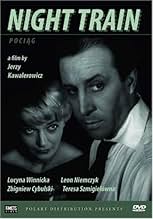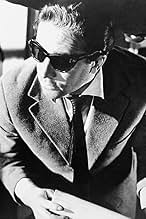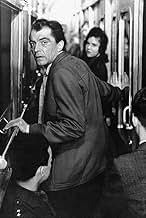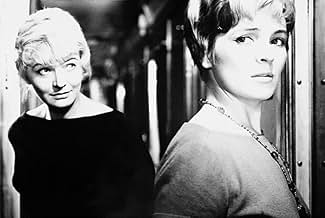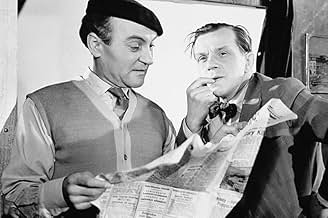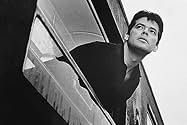IMDb RATING
7.7/10
3.9K
YOUR RATING
Jerzy enters a train set for the Baltic coast. He seems to be on the run from something, as does the strange woman with whom he must share a sleeping compartment.Jerzy enters a train set for the Baltic coast. He seems to be on the run from something, as does the strange woman with whom he must share a sleeping compartment.Jerzy enters a train set for the Baltic coast. He seems to be on the run from something, as does the strange woman with whom he must share a sleeping compartment.
- Director
- Writers
- Stars
- Awards
- 2 wins & 1 nomination total
Andrzej Herder
- Sailor
- (uncredited)
Barbara Horawianka
- Jerzy's Wife
- (uncredited)
- Director
- Writers
- All cast & crew
- Production, box office & more at IMDbPro
Featured reviews
10gombro
The film beautifully depicts the reality of trains, possibly not only those running in Poland but also all over the world. The claustrophobic atmosphere of the train brings people together and lets the viewers plunge into the story and its rhythm. Beautiful black and white pictures and melancholic jazz theme bring to mind other films form the era. What makes the film even more attractive is the final turning point and sudden change in the behavior of the passengers. The only regretful fact is that such intimate,subtle films are not made anymore. Great pity.If it was made in English by lets say Orson Welles it would have been a cult movie for sure all over the world just as it is in Poland.
10adipocea
This is a film which is a privilege to watch, I don't understand why Criterion collection doesn't have this issued yet. If you didn't watch it make yourself one of the biggest favors and watch it right away. I won't describe the movie, I won't spoil your pleasure. This is not a great movie in the sense that other great movies from the same period are considered masterpieces by critics but when we come to watch them they impress us very little. This is a treat, a delight, a thrill, by any modern standards, you have just to find some good subtitles not the lousy ones available on the web and translated online word by word by translation websites. I myself have watched the movie with this kind of subtitles and still I managed to be impressed to tears by this gem. A big bravo to Jerzy Kawalerowicz!
This is definitely one of the greatest, and at the same time, one of the most under-appreciated movies in the history of Polish cinema. Jerzy Kawalerowicz is a true master craftsman in the country's film world, and with Night Train he once again proved that this statement is perfectly true. It's a shame that the movie is sometimes cruelly omitted when talking about fine post-war cinema, because it is certainly worth a watch.
Night Train is different from other various Polish movies that came out in the 50's and later, as it doesn't present the social problems that the country had to fight with during the difficult period of Communism.
It reminds me of the movies directed by the Master of Suspense, Sir Alfred Hitchcock, as it contains the recurring themes of murder, suspenseful mystery, the wrongly accused man and a search for the real criminal.
It also reminds me of the great noir movies produced in the United States or Italy throughout the 20th century. It possesses a deeply sombre tone and claustrophobic ambiance created by the particular scenery, in which it takes place - a train. All of this is complemented with an eerie music playing in the background.
Aboard the train, which goes from Lodz to the seaside in Poland, there are many unusual, strangely mysterious, and overly suspicious passengers. One of them is Jerzy, the main character, played brilliantly by Leon Niemczyk. Strolling around in his classy dark glasses he seems like he needs to hide from something or someone. Unfortunately, due to some peculiar circumstances, he has to share the sleeping cabin with a pretty lady, Marta. However, as time passes by, the two are starting to have a connection, because of the seemingly similar life experiences and peculiar interests.
In the neighboring compartment we can find an unnamed man with his nosy wife, who quickly starts to flirt with distracted Jerzy. She looks so unhappily married that she resolves to flirting with almost all of the co-travelers.
Then there is also Staszek, the boy, who is deeply in love with Marta, but, due to some unmentioned previous occurrences, she doesn't want to be with him any more.
All those characters' affairs intertwine at various points in the storyline. Great and clever dialogues accompany every scene. And in the middle of it all there is the tranquil search for the murderer. However, as important as it may seem sometimes, it isn't actually the main topic of Night Train.
The hunt for the killer occurs in the climax of the movie, when an angry mob runs through the train cars and into the woods to finally catch him. What happens next – the public execution (however not deadly) reminded me of the great western The Ox-Bow Incident. The will of the majority always wins, no matter if someone is legally found guilty or not.
The final scene beautifully reflects what had happened on that night - the compartments are empty, and look somehow pure, but the scattered belongings and open windows give the sequence an obscure touch.
All in all, Night Train is truly a fantastic Polish movie with many suspenseful twists, romance and a huge emphasis put on various characters' personalities, in order to show that anonymity is omnipresent and everyone can almost hide in its shadow if he wants to.
Night Train is different from other various Polish movies that came out in the 50's and later, as it doesn't present the social problems that the country had to fight with during the difficult period of Communism.
It reminds me of the movies directed by the Master of Suspense, Sir Alfred Hitchcock, as it contains the recurring themes of murder, suspenseful mystery, the wrongly accused man and a search for the real criminal.
It also reminds me of the great noir movies produced in the United States or Italy throughout the 20th century. It possesses a deeply sombre tone and claustrophobic ambiance created by the particular scenery, in which it takes place - a train. All of this is complemented with an eerie music playing in the background.
Aboard the train, which goes from Lodz to the seaside in Poland, there are many unusual, strangely mysterious, and overly suspicious passengers. One of them is Jerzy, the main character, played brilliantly by Leon Niemczyk. Strolling around in his classy dark glasses he seems like he needs to hide from something or someone. Unfortunately, due to some peculiar circumstances, he has to share the sleeping cabin with a pretty lady, Marta. However, as time passes by, the two are starting to have a connection, because of the seemingly similar life experiences and peculiar interests.
In the neighboring compartment we can find an unnamed man with his nosy wife, who quickly starts to flirt with distracted Jerzy. She looks so unhappily married that she resolves to flirting with almost all of the co-travelers.
Then there is also Staszek, the boy, who is deeply in love with Marta, but, due to some unmentioned previous occurrences, she doesn't want to be with him any more.
All those characters' affairs intertwine at various points in the storyline. Great and clever dialogues accompany every scene. And in the middle of it all there is the tranquil search for the murderer. However, as important as it may seem sometimes, it isn't actually the main topic of Night Train.
The hunt for the killer occurs in the climax of the movie, when an angry mob runs through the train cars and into the woods to finally catch him. What happens next – the public execution (however not deadly) reminded me of the great western The Ox-Bow Incident. The will of the majority always wins, no matter if someone is legally found guilty or not.
The final scene beautifully reflects what had happened on that night - the compartments are empty, and look somehow pure, but the scattered belongings and open windows give the sequence an obscure touch.
All in all, Night Train is truly a fantastic Polish movie with many suspenseful twists, romance and a huge emphasis put on various characters' personalities, in order to show that anonymity is omnipresent and everyone can almost hide in its shadow if he wants to.
You know from the first minute that this is a different kind of train thriller. The first shots are in the station, lots of people bustling about, but instead of "busy" music on the soundtrack, the music here is slow, and it is cool jazz. This sets up the detached tone from the beginning. Some of the characters are nervous, even hysterical, but the director keeps everything at arm's length.
The story is very simple: A man on the train is fleeing after killing his wife. It is not known whether he is alone or with a woman. The movie concentrates on two couples, a single woman, and a single man. The three women move between the men--are they ordinary women looking for companionship, or is one of them trying to help, or escape from, the killer?
The scene in which the murderer is caught will recall the same scene in M and, of course, since the movie is Polish, the hunting down of fleeing, terrified people which so recently happened on Polish soil. The photography, excellent throughout, is especially beautiful and powerful in this scene. The director makes us aware of the symbolism, but not in an obtrusive way. The man who picks up the Cross and what he does with it quietly makes the point that the murderer and his pursuers are not different in kind, only in degree.
The story is very simple: A man on the train is fleeing after killing his wife. It is not known whether he is alone or with a woman. The movie concentrates on two couples, a single woman, and a single man. The three women move between the men--are they ordinary women looking for companionship, or is one of them trying to help, or escape from, the killer?
The scene in which the murderer is caught will recall the same scene in M and, of course, since the movie is Polish, the hunting down of fleeing, terrified people which so recently happened on Polish soil. The photography, excellent throughout, is especially beautiful and powerful in this scene. The director makes us aware of the symbolism, but not in an obtrusive way. The man who picks up the Cross and what he does with it quietly makes the point that the murderer and his pursuers are not different in kind, only in degree.
Although it has superficial similarities with Hitchcock films (it's in black and white; it takes place on a train; it's a murder mystery; there are plenty of red herrings and misleading clues), I loved this moody Polish film because it is visually stunning and refreshingly free of Hollywood clichés. I saw a lot of Expressionist influence in the artfully planned staging and unusual camera angles, both inside the cramped railway corridors and outside the train in various stops along the route. The film is fairly demanding on the viewer: there are a lot of secondary characters with complicated stories of their own, and I found myself repeatedly pausing the DVD to catch details that I had missed. The final scenes were intricately choreographed and highly stylized, reminiscent of black-and-white-era Fellini. Not for everyone, but I found it delightful and plan to watch it again.
Did you know
- TriviaStaszek, the young man following Marta, is seen several times getting on the train after it has started moving. The inspector warns him a couple of times that it is dangerous. Zbigniew Cybulski who plays Staszek died a few years later, aged 39, after falling under a moving train he was attempting to board at Wroclaw Glowny railway station in Poland.
- ConnectionsFeatured in Fejezetek a film történetéböl: A lengyel film (1990)
- How long is Night Train?Powered by Alexa
Details
- Runtime1 hour 39 minutes
- Color
- Sound mix
- Aspect ratio
- 1.37 : 1
Contribute to this page
Suggest an edit or add missing content


